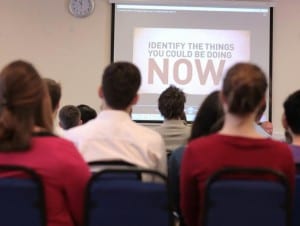Careers in Theatre Round up
By UCL Careers, on 28 April 2015
As part of University of London’s Careers in the Creative Industries webinar series, we invited Jethro Compton – a writer, director and independent theatre producer – to come in and answer your questions. 
Jethro had five top tips to share with aspiring theatre professionals:
- Don’t talk about doing it – just do it!
When you’re networking with people in the industry, it helps if you can talk about work you have actually done, rather than saying you ‘haven’t got started yet’. Jethro pointed out that lots of people starting out are too scared of failure to take their first steps into the industry – but he stressed how important it was to start doing something, and not to be put off by the few people who find success in the industry with little struggle. For example, whilst Jethro was an undergraduate at the University of York, he started his network at the Drama Society. Your college may have one, and maybe even a separate society for technical theatre folk!
- Let your work speak for itself (and you).
Jethro is an advocate for concentrating more on making good work that makes an impact, rather than worrying too much about promoting your professional self. But he recognises it’s also important to build contacts and network – even if this doesn’t come naturally to you.
- Aim high – don’t be afraid of failure.
Tied into the above points, don’t be afraid to have goals that push you outside of your comfort zone. The important thing is not to get disheartened if things don’t go to plan immediately! Measuring yourself against others is a waste of time – set your own realistic goals and use them to evaluate your progress – that might just mean asking yourself at the end of a long week: am I happy? Have I made it through the week? A positive mental attitude is extremely important – it shows…
- Always be nice! Never feel entitled.
The theatre industry is a small world and word gets around if you have a bad attitude, making you difficult to work with. Like any industry, it is important to nurture positive relationships by being enthusiastic, willing and happy to help. Recognise that everyone in the industry is struggling, and remember that you never know when you might need this person on side. Obviously you should never be so willing as to be exploited – but use your judgement and avoid sounding like the world owes you a favour. This means making your own opportunities rather than wondering why the phone isn’t ringing with offers of work.
- Be patient – it’s all about the long-game.
When you’re networking (and networking can happen by email or even Twitter – it’s not all about schmoozing at drinks receptions), try to treat it more like a connection between two like-minded people, rather than immediately assessing who is going to ‘get something out of it’. Jethro told us about cups of coffee he’s had with people in the industry that are initially just about sharing what you do – and then, a few months down the line, these connections can turn into them helping you out with last minute props, them coming to see your show, or more. Try to see the long-game when you’re making these connections and nurture them over time.
The financial struggles of the industry
Although he now runs his own independent production company, Jethro has worked with a lot of freelancers. His tip for those of you who are considering freelancing, particularly if you are looking at acting or writing, where it can be difficult to get longer-term freelance jobs, is try to supplement these by using your skills in the technical aspects of theatre. Lighting technicians and stage managers etc are always in short supply in the industry, so if you can develop skills in this area you can diversify your offering.
On the flip side, Jethro has also had a salaried role working for a West End producer – in some areas like production, one year salaried posts are more common. Obviously whilst this was more financially secure, Jethro didn’t have so much time or freedom to pursue his own creative agenda.
Jethro’s pick of resources:
For aspiring producers: Stage One awarded Jethro his first bursary and, if you’re interested in the technical side of theatre, they offer paid apprenticeships , workshops and seminars.
Twitter – Producers, directors, agents and casting directors will put out the majority of their calls for actors and other staff on Twitter. Twitter is a legitimate networking tool in the theatre industry, so use it well (and wisely)!
Look out for Jethro’s productions, as well as his workshops and seminars, at the Edinburgh Festival 2015. More webinars from the Careers in Creative Industries group are coming soon.
See also: Wannabe Creatives – Have You Considered the ‘Passion’ vs ‘Security’ Trade-off?
 Close
Close






